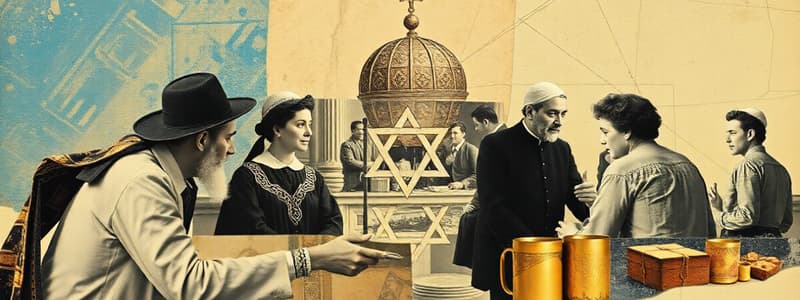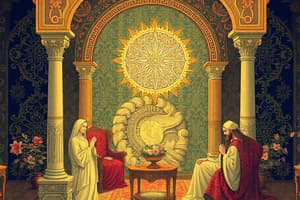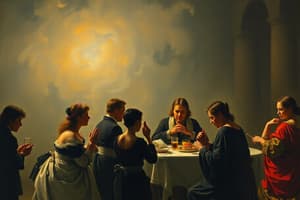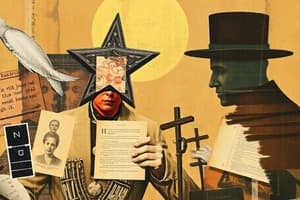Podcast
Questions and Answers
What is the primary purpose of Hatarat Nedarim during Rosh Hashana?
What is the primary purpose of Hatarat Nedarim during Rosh Hashana?
- To cancel all promises and vows (correct)
- To seek forgiveness from God
- To exchange gifts with others
- To partake in communal prayers
What is the significance of Rosh Hashana being the day of judgement?
What is the significance of Rosh Hashana being the day of judgement?
- It marks the creation of the world
- It commemorates the exodus from Egypt
- Adam Ha'Rishon sinned and was judged on this day (correct)
- It signifies the beginning of the harvest season
What do the three books mentioned during Rosh Hashana represent?
What do the three books mentioned during Rosh Hashana represent?
- The righteous, the average, and the wicked (correct)
- Faith, repentance, and charity
- The past, present, and future
- Life, death, and rebirth
What does being labeled a Beinoni entail on Rosh Hashana?
What does being labeled a Beinoni entail on Rosh Hashana?
What is the practice called where one takes chicken or money over the head?
What is the practice called where one takes chicken or money over the head?
What does the term 'Simana Milta' signify?
What does the term 'Simana Milta' signify?
What is the final meal called on Erev Yom Kippur?
What is the final meal called on Erev Yom Kippur?
What is one reason stated for wearing white on Yom Kippur?
What is one reason stated for wearing white on Yom Kippur?
What is the meaning behind the word 'Neila' during Yom Kippur?
What is the meaning behind the word 'Neila' during Yom Kippur?
What action is performed when saying Vidur?
What action is performed when saying Vidur?
Flashcards are hidden until you start studying
Study Notes
Rosh Hashana
- Hatarat Nedarim: The canceling of all promises and vows. It is important to do Hatarat Nedarim because it is a serious matter to have promises being broken.
- Erev Rosh Hashana Customs:
- Arise early and say Selichot.
- Rosh Hashana as the Day of Judgement: Rosh Hashana is chosen as the day of judgment because Adam HaRishon sinned and was judged on the same day.
- Three Books: On Rosh Hashana, Hashem judges all of mankind and places them into one of three books:
- Tzadikim: The righteous.
- Reshaim: The wicked.
- Beinonim: Those who are neither righteous nor wicked.
- Beinoni: A Beinoni is someone who is exactly even. They are neither good nor bad.
- Beinoni Judgement: If someone is considered a Beinoni on Rosh Hashana, their judgement is postponed until Aseret Yimei Teshuva and signed on Yom Kippur.
- Simana Milta: Symbols are real, meaning they are not just empty gestures but have actual meaning.
Yom Kippur
- Kapparot: A custom where we take chicken or money over our heads.
- Erev Yom Kippur Mitzvah: It is a mitzvah to eat on Erev Yom Kippur.
- Importance of Asking Forgiveness: It is imperative to ask forgiveness from people on Erev Yom Kippur because Hashem only forgives sins between us and people if those people forgave us.
- Vidur: During Vidur, we pound our chest in remorse.
- Seudat HaMafseket: The final meal on Erev Yom Kippur.
- Yom Kippur Restrictions: We cannot do the following on Yom Kippur:
- Eating
- Drinking
- Washing
- Applying oils or creams (or anything to the skin)
- Wearing leather shoes
- White Clothing: We wear white on Yom Kippur to symbolize purity and cleanliness.
- Kol Nidrei: We say the Kol Nidrei tefilla three times, each time a little louder than the last.
- Neila: The extra Shmoneh Esrei that we add on Yom Kippur.
- Meaning of Neila: "Neila" means "closing". The Neila prayer is the final prayer of Yom Kippur as the Gates of Heaven are believed to be closing.
- Reading the Book of Jonah: It is customary to read the Book of Jonah on Yom Kippur because it teaches us that Hashem accepts Teshuva (repentance).
Studying That Suits You
Use AI to generate personalized quizzes and flashcards to suit your learning preferences.




